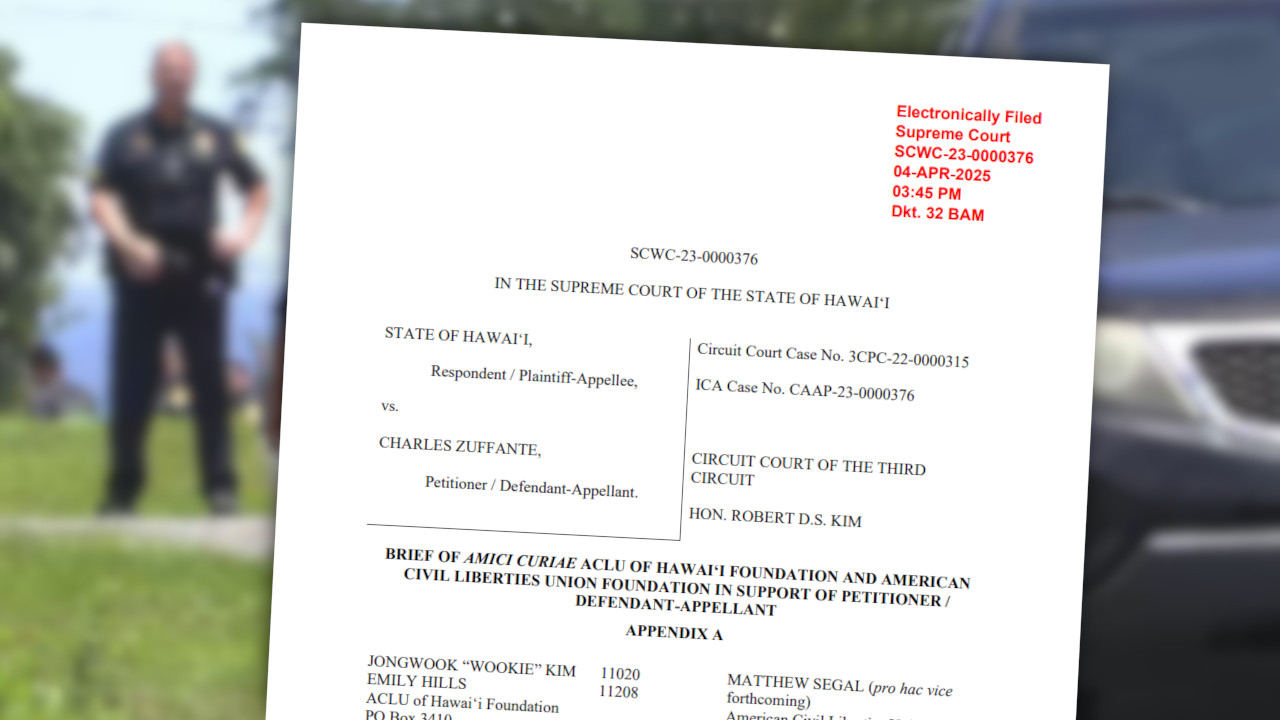(BIVN) – The ACLU is asking the Hawaiʻi Supreme Court to require that law enforcement record custodial interrogations.
On April 4, the ACLU of Hawaiʻi and the ACLU State Supreme Court Initiative filed an amicus brief in the case of State v. Zuffante. The Hawaiʻi Supreme Court will hear oral arguments in the case at the University of Hawaiʻi at Hilo on April 17, 2025.
State v. Zuffante involves a criminal defendant who was arrested in Kona and later interrogated by Hawaiʻi County police. The interrogation was not recorded or contemporaneously memorialized, and “over a year later, at trial, the officer testified that, in the interrogation room, the defendant had waived his Miranda rights and confessed to the crimes,” the ACLU summarized.
This description of the case was posted by the Hawaiʻi Judiciary:
This case arises from a traffic stop in Kona, Hawaiʻi. An officer conducted a pat down of Petitioner Charles Zuffante and found a packet of crystal methamphetamine in his pocket. Police later found more methamphetamine in the vehicle.
Following Zuffante’s arrest, a Hawaiʻi Police Department officer questioned Zuffante at the police station. At trial, the officer testified that Zuffante voluntarily waived his Miranda rights and made statements to him, including that Zuffante sells crystal methamphetamine.
A jury found Zuffante guilty of Attempted Promotion of a Dangerous Drug in the First Degree in violation of Hawaiʻi Revised Statutes §§ 712-1241(1)(b)(ii) and 705-500. The Circuit Court of the Third Circuit sentenced him to twenty years imprisonment.
Zuffante appealed to the Intermediate Court of Appeals (ICA), arguing that his statements to the officer were not voluntary. He argued the Circuit Court erred by admitting the officer’s testimony, because Zuffante’s statement was not electronically recorded. Zuffante asserted that, under the Hawaiʻi Constitution, Hawaiʻi should adopt the “Stephan Rule” from Stephan v. State, 711 P.2d 1156 (Alaska 1985), which requires under the due process clause of the Alaska Constitution that police record criminal interrogations conducted at a police station. Zuffante argued that without the officer’s testimony about Zuffante’s statements, the State did not present substantial evidence to support his conviction. Zuffante also claimed his counsel was ineffective for not challenging the officer’s testimony. The ICA affirmed the Circuit Court.
Zuffante’s application for certiorari to this court was granted. He argues the ICA gravely erred by (1) affirming the Circuit Court’s admission of the officer’s testimony; (2) finding there was substantial evidence to sustain Zuffante’s conviction; and (3) not addressing Zuffante’s ineffective assistance claim. Zuffante argues the supreme court should overrule State v. Kekona, 77 Hawaiʻi 403 (1994), where the court directly rejected the “Stephan Rule,” and instead require that police record custodial interrogations.
According to an ACLU news release, their amicus brief “argues that the failure to record the interrogation was both unfair and unconstitutional, and asks the Hawaiʻi Supreme Court to reconsider a 1994 decision that held that custodial interrogations do not need to be recorded. In the ACLU’s view, that position is no longer tenable, especially when there is no emergency, given advances in technology, including the widespread adoption by police of body-worn cameras, and an evolving national consensus about what fundamental fairness demands.”
The brief notes that 31 states now require or facilitate the recording of certain custodial interrogations.
The Hawaiʻi Innocence Project also filed an amicus brief in the case.
“In 2025, when every officer has a body camera and a cell phone, there’s no excuse for failing to record a custodial interrogation,” stated ACLU of Hawaiʻi Legal Director, Wookie Kim. “We call upon the Court to uphold its long and proud tradition of ensuring fundamentally fair trials by adding this critical procedural safeguard.”
“The legal and technological landscape has changed dramatically in the last three decades,” said ACLU State Supreme Court Initiative Co-Director, Matthew Segal. “That’s why most states now require police to record certain custodial interrogations, either through statute or court decision. The time has come for Hawaiʻi to join that growing consensus.”
“This case is about more than one interrogation or one trial—it’s about upholding the integrity of our entire justice system,” said ACLU of Hawaiʻi Executive Director, Salmah Rizvi. “Ensuring that interrogations are recorded protects the truth-seeking function of our courts and increases the public’s trust that the system will reach just outcomes.”


by Big Island Video News6:59 am
on at
STORY SUMMARY
HILO, Hawaiʻi - In a Hawaiʻi Supreme Court case involving the Hawaiʻi county police, the ACLU of Hawaiʻi requests the law require police to record custodial interrogations.